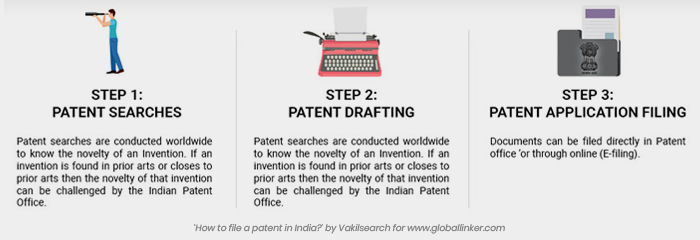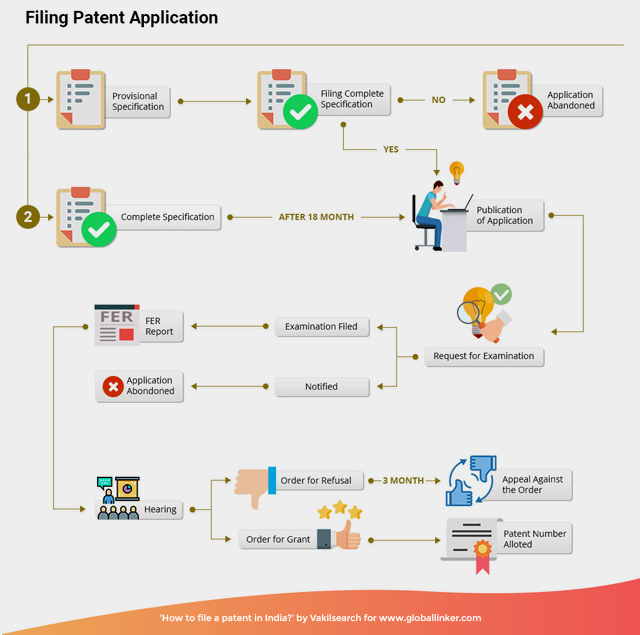How to file a patent in India?

Legal & Compliance
280 week ago — 6 min read
Background: A patent is a legal shield to protect your unique innovation. It can prevent your idea being illegally used by competitors. Here is the process to file a patent in India.
Who can apply for a patent in India?
In India, the Patents Act is the central legislation dealing with the filling and regulation of existing and new patents in India. The Patent Act suggests that either the inventor, his assignee or his legal representative (in the case where the inventor is deceased) can apply for patents at the head office of the Indian patent office. However, the application can also be filed in the branches of the office, depending upon the jurisdiction where the person applying for the patent resides or has a domicile or has the principal office.
In case the applicant is not a citizen of India (i.e., a foreign applicant), the applicant should be filing the application for patent in whose jurisdiction the address for service or patent’s attorney is situated.
Also read: 10 things entrepreneurs should know about patents
What can be patented?
In order to file a valid patent application, first, it has to be ascertained whether the product is patentable or not. The essence of checking patentability is to ascertain whether the said product has the NIU (novelty, inventiveness, utility) factor. The NIU factor includes the following pointers:
- Novelty: Novelty means that the product which is sought to be registered is novel or new. In the sense that something as such has never been seen or used before.
- Inventiveness: Inventiveness refers to the application of some creativity which has been applied for the first time for solving a purpose.
- Utility: Utility refers to the outcome and the use of the product so sought to be invented. What is the use of bringing this product to the market and what function it aims to simplify?
Single Inventive Concept: The general rule says that the application for patent can be made either for one invention or a group of inventions which can be clubbed under the single inventive concept.
Required Documents: Apart from the patent and specification, the applicant is required to submit the following documents in order to create a proper patent application:
- Declaration of inventorship
- Complete specification including claims, abstract and drawings, if any
- Undertaking and statement by the applicant
- A proof concluding the right to make an applicant
- In case an agent has been authorized to make the application, the letter of authorisation shall also be furnished
Different types of registration of patent: Complete & provisional
Provisional application is a transitory application which is usually filed then the innovation is not completely finished but is still in the stage of experimentation, though there has to be clarity on the idea. After filing the provisional application, the applicant does get a time of 12 months to complete the application. In these 12 months, the applicant is to conclude the innovation and to assess its marketability potential and the advantages attached.
Once a provisional application is filled and accepted, then the applicant can put the tag of “patent pending” on the product desired to be patented. Also, in order to secure one’s rights over the product so sought to be patented, it is necessary that the provisional application is made definitely and precisely. However, the nature of the provisional application is temporary in nature and has to be accompanied by a detailed application within 12 months.
Original Application: An original application is one which doesn’t require a prior claim of temporary application. Once the product is complete in its form and structure, then the original application is filled with all the requirements at once.
Requirements for filing an ordinary patent application which needs to submit in order to file a patent.
1) Details of the applicants including their name, address and nationality
2) Details of the inventors including name, address, and nationality of the inventor(s).
3) Complete specification (or provisional specification if provisional application) needs to be filled.
4) Details relating to the patentable product including description, claims, abstract & drawings, if any.
5) Details pertaining to corresponding foreign applications, including application number, date of filing and current status.

Stepwise Procedure: After having identified and clearly laying down the idea in definite and precise terms, the next step pertains to patent-check. It essentially relates to the fact one needs to search whether such a product patent exists previously in the country. It can only be possible to patent the product when such a product doesn’t already exist and thus a patent search is important. Then, gather and organize the required documents for a valid application (as mentioned above) and then file an application for request for examination (RFE). In furtherance of the RFE, create an examination report and then after a due check of the examination report, the patent is granted.

Also read: Patents: Advantages & obstructions
Image source: shutterstock.com
To explore business opportunities, link with us by clicking on the 'Connect' button on our eBiz Card.
Disclaimer: The views and opinions expressed in this article are those of the author and do not necessarily reflect the views, official policy or position of GlobalLinker.
Posted by
Vakilsearch StaffGreetings! We would love to work with you and your company. We look forward to connecting with business houses and MSME's.
View Vakilsearch 's profile
Other articles written by Vakilsearch Staff
Know About the 4 Types of Partnership Firms
37 week ago
Most read this week
Trending
Ecommerce 4 days ago













Comments
Share this content
Please login or Register to join the discussion